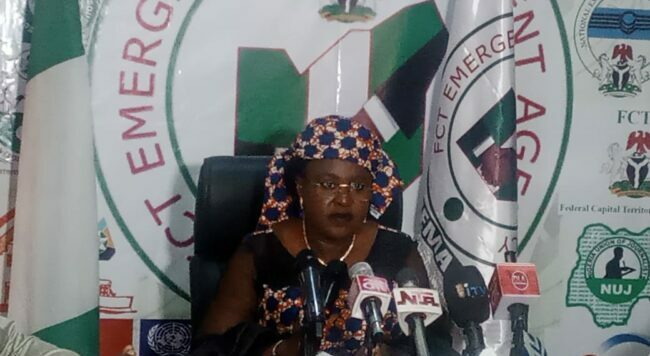The FCT Emergency Management Department (FEMD) has identified fourteen major causes of the recent series of emergencies that occurred between June 24 and July 13, 2024, in Abuja, which it responded to alongside other agencies and partners.
FEMD disclosed that within the past twenty (20) days, it responded to the following major (7) incidents: a flood incident at Trademore Estate, a fire incident at Karu Market, a building collapse incident at Guzape District, a building collapse at Prince and Princess Estate, a building collapse at Nkwere Street, Garki, a building collapse at Kubwa Phase II, a suicide attempt, and Aso TV/Radio Mast, Katampe.
Briefing newsmen on the situation in Abuja, the FEMD’s acting Director General, Lady Florence Wenegieme, said among the causes of the incidents that occurred within the period are building on waterways and flood plains, the persistent attitude of residents dumping waste on waterways, non-adherence to the Fire Safety Code, the use of substandard electrical materials, illegal electricity connections, the storage of volatile substances in markets, and the high use of combustible materials in building construction.

According to Wenegieme, others include non-adherence to the National Building Code, activities of quacks in building construction, use of sub-standard construction materials, violation of building approval through additional loads, building or carrying out maintenance work without regulatory approvals, non-compliance with the Land Use Act, as well as non-conducting an environmental impact assessment before building construction.
She, however, opined that going forward, in terms of preventing, mitigating, or responding to such incidents, there is an urgent need to strengthen collective action on some of the outlined measures.
According to her, the measures include a review of the existing laws in the building industry to tackle the rising trend of building collapse incidents, including stiffer punishment for violators, especially when lives are lost.
She added that the Fire Safety Code should be reviewed to stipulate the use of non-combustible materials in building construction in order to reduce fire risk.

“There is a need to review and strengthen fire safety regulations in terms of inclusive access to fire extinguishers (proper placement), fire alarms, and directional signage/emergency communication for all users of public buildings.
“There is a need for building regulatory agencies and departments to step up quality assurance in terms of the use of standard materials in building construction from start to finish.
“Developers should submit an Environmental Impact Assessment report of the building site together with the building plan to enable proper assessment of the technical specifications side by side with the peculiarities of the location to avoid building collapse.
“There is a need to involve professional bodies such as the Nigerian Institute of Architects, the Nigerian Institution of Quantity Surveyors, the Nigerian Institute of Roads and Building Infrastructure, and the Nigerian Society of Structural Engineers in building approval and inspection.
“There is a need to carry out an integrity test on all-story buildings within the location of a collapsed building, and all developers should provide insurance cover to workers on-site throughout the duration of the project.
“Building regulatory agencies and departments should make it mandatory for developers to carry out integrity tests on structures before carrying out renovation or resuming construction work where such structures have been abandoned for a longer period of time.
“Developers should provide artisans and labourers on site with personnel protective wear to enhance their safety, and the Department of Development Control should make it mandatory that developers submit the professional certification of site engineers as part of securing building approval to eliminate the activities of quacks and also make the developers more accountable when building collapse incidents occur.
“Building regulatory agencies and departments should strengthen regulatory compliance by developers with technical requirements in building construction with regards to structural stability against dead loads (self-weight, permanent loads) and live loads (imposed loads), which are mostly compromised by the use of sub-standard materials.
“All owners of buildings above two (2) stories should submit a report to the Department of Development Control every 3 years detailing the status of their elevators, fire equipment, and other critical facilities, including the last maintenance carried out and the date, as part of maintaining the fitness of the structure for habitation.
“Developers should submit a building plan with clear specifications of the construction materials to be used, including electrical fittings and other necessary facilities, for the purpose of quality assurance compliance monitoring.
“All buildings should be inspected by relevant authorities on completion to see if they meet minimum safety standards before they are certified for human habitation or whatever purpose they are meant for.
“The National Orientation Agency should intensify its campaign on civic responsibility to stimulate positive behaviour and a sense of patriotism among citizens at this period rather than some resorting to suicide attempts or other forms of negative behaviour,” the FEMD stated.
She further added that as part of FEMD’s disaster risk reduction drive, the Department, within the limits of available resources and in the spirit of humanitarian work, has been carrying out activities such as monitoring to ensure that structures standing on waterways that have been removed, as instructed by the Honourable Minister, do not spring up again; a multi-disaster risk sensitization and awareness campaign in the media and through community outreach; and the production and airing of early warning jingles in five (5) different languages pertaining to flood and fire outbreaks, building collapses, and other potential emergencies.
ALSO READ THESE TOP STORIES FROM NIGERIAN TRIBUNE







